Back For The Attack: Part II Of Jeff Kerby’s Dokken Interview
By
Jeff Kerby,
Contributor
Tuesday, February 12, 2002 @ 11:48 AM
| PART 2: Jeff Kerby Goes Head T
|
 |
|
To read Part 1, click here.
At this point in the interview, my buddy the stage manager came into the trailer at least three or four times after the allotted ten minutes had expired. Most of the time he never said a word although a couple of times he did half-heartedly point to his watch and amble around the room, but in the end it was to no avail. Don Dokken was on a roll. The interview continued right up until about twenty minutes before show time. While he talked, I watched as Don signed promotional materials and took care of the practical jobs that most people don’t think about. They are the kind of duties that mean everything to the fans yet at the same time ones that I could imagine might become tedious and rote for the musician when performed day after day in city after city. There were times when I was struck by how unglamorous it really was and how I, like thousands of others, just assume that when a band goes platinum the world becomes a cleaner, sunnier place.
Before I knew it, I realized that my ten minutes had turned into forty-five. Mick continued to drift in and out of the room, and Don became a little more reflective with each response. As I said in the preface to part one, the statements Dokken made, just like the surroundings in which he made them, aren’t always pretty, but at least they were real….at least regarding how he felt on this particular day. In the end, that’s really all I could have asked for.
KNAC.COM: Is it even possible to front a successful band without having the perception in certain circles that you can be difficult at times?
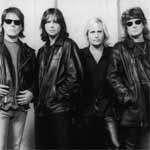 DOKKEN: It’s like being stereotyped on a comedy show. It’s like these people in the ‘60s had these shows like the Partridge Family or whatever and you get stereotyped. Face it, Jeff is known as the bass player in Dokken. George is known as the guitar player in Dokken, and they’re both fighting it tooth and nail. No pun intended. You know, and George went out of his way not to sound like Dokken. It’s like I’m thinking, “Well, that’s just the way you sound.” I could do that too. I could go on stage every night and do everything in my power not to sound like me.
DOKKEN: It’s like being stereotyped on a comedy show. It’s like these people in the ‘60s had these shows like the Partridge Family or whatever and you get stereotyped. Face it, Jeff is known as the bass player in Dokken. George is known as the guitar player in Dokken, and they’re both fighting it tooth and nail. No pun intended. You know, and George went out of his way not to sound like Dokken. It’s like I’m thinking, “Well, that’s just the way you sound.” I could do that too. I could go on stage every night and do everything in my power not to sound like me.
KNAC.COM: Yeah, you could sound like Radiohead.
DOKKEN: I’m gonna go and sing monotone? I’m not gonna do that. I was flabbergasted when that came out. That just goes to show you, Jeff wanted to go in that direction, but that’s not Dokken.
KNAC.COM: If the Don Dokken of 1985 could look into the future and see you today -- see what your doing now -- see what you’re into -- what would he think? You know, if you had a chance to sit there and evaluate it. What would the you of the past think?
DOKKEN: Oh, that’s hard. I don’t know. The thing is now, it’s an interesting thing that’s going on in Dokken, and I’m glad it happened. In ‘85 we were more motivated by fame. Be the best. Be the biggest. Win the World Series. Get the Super Bowl. We got the Super Bowl -- Monsters of Rock. We made it. Sold millions of records. Made lots of money. We all had nice homes. The thing is now we don’t go on the road anymore because we have to. In other words, I don’t feel that we have to prove anything. It’s like, been there, gone to the top of the mountain, great view. I loved it, but now we’re back on the other side of the mountain. If we get back on the top of the mountain, maybe we’ll look on the other side. If this thing stops in a year, if this new album comes out and doesn’t go, at least we can say we gave it our best shot. It’s been a really freaky tour, this tour. It’s been packed every night. Go to Pollstar, everybody’s freaking out. No one expected this.
KNAC.COM: A great night on this tour versus a great night in '86 or '87 -- which is more satisfying?
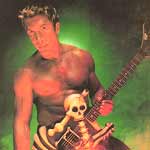 DOKKEN: Much more satisfying now because we don’t walk backstage at the end of a show and start fist fighting. We get along now. The George thing was really a mistake from the beginning. I stayed with him because he was a genius guitar player. He and I were already going at it before Breaking the Chains was ever even released. We were going at it in rehearsal. From day one, George and I were going at it. We were just two different personalities, and I kept thinking success would cure it. Success would heal it. Money, rich, be a millionaire, and I thought I was gonna be happy. I was a little naïve thinking money and fame would smooth the feathers of the Dokken entourage. It didn’t. It just made it worse. When we got back with him, I thought after five years where we’d fallen from grace and weren’t playing arenas anymore -- I thought we’d be a little more appreciative of other people’s personality differences. I’m this way, you’re this way, Mick’s this way. There’s shit Mick does that I don’t like, but there’s shit I do that he doesn’t like either. I’m very intense. He’s come to accept that I’m a very intense person. I’m intense in the studio. I’m fucking hard to deal with. I want the music to be over the top. If it’s a hundred percent, I’m going, “what about a hundred and five?” I’m always pushing, pushing, pushing. It’s just my personality.
DOKKEN: Much more satisfying now because we don’t walk backstage at the end of a show and start fist fighting. We get along now. The George thing was really a mistake from the beginning. I stayed with him because he was a genius guitar player. He and I were already going at it before Breaking the Chains was ever even released. We were going at it in rehearsal. From day one, George and I were going at it. We were just two different personalities, and I kept thinking success would cure it. Success would heal it. Money, rich, be a millionaire, and I thought I was gonna be happy. I was a little naïve thinking money and fame would smooth the feathers of the Dokken entourage. It didn’t. It just made it worse. When we got back with him, I thought after five years where we’d fallen from grace and weren’t playing arenas anymore -- I thought we’d be a little more appreciative of other people’s personality differences. I’m this way, you’re this way, Mick’s this way. There’s shit Mick does that I don’t like, but there’s shit I do that he doesn’t like either. I’m very intense. He’s come to accept that I’m a very intense person. I’m intense in the studio. I’m fucking hard to deal with. I want the music to be over the top. If it’s a hundred percent, I’m going, “what about a hundred and five?” I’m always pushing, pushing, pushing. It’s just my personality.
KNAC.COM: So you have to have a dynamic in the band that’s going to work with that?
| “We don’t go on the road anymore because we have to. We have to prove anything. Been there, gone to the top of the mountain, great view.” - Don |
|
DOKKEN: Yeah, that’s probably why Mick’s still playing in the band is that he came to understand that. I just said, “Let me run with the ball and let’s do it the way we want to do it rather than compromising all the time.” I’m tired of writing songs where it’s like these are so and so’s lyrics and it’s all so-so, but since we’ve got to keep everyone happy—we end up doing the song anyway. The whole time I’m going “this song is kinda lame” but he’s in the band, it’s his song and he wants it on the album. This is the first album we’ve ever done where we haven’t had to compromise -- I take that back -- I think Dysfunction was also no compromise.
KNAC.COM: Were the tours during that period more enjoyable?
DOKKEN: Yeah, I thought the Poison tour was fun. Even though I had a broken leg. I broke my fricken’ leg seven shows in so everyone was thinking I was a drug addict. “I saw Don, he was out of his mind. He was stoned.” I had a broken leg, you know, but I did the show ok. I thought, “Wow, this is ten thousand people.” But things change. Poison was headlining at the time --
KNAC.COM: How weird was that?
DOKKEN: Yeah, what’s up with that?
KNAC.COM: Ok, ok, I’m gonna say it—I saw them on that tour, and they were bad. They were just horrible the night I saw them. CC acted like—
DOKKEN: It was the same every night.
KNAC.COM: Wasn’t there a reason—
DOKKEN: There was no reason for them to sound like that.
 KNAC.COM: That’s a given, but was there a reason they were headlining the Power to the People tour besides simply fan demand? Were there managerial issues?
KNAC.COM: That’s a given, but was there a reason they were headlining the Power to the People tour besides simply fan demand? Were there managerial issues?
DOKKEN: No, I think the VH-1 special launched them again. I think honestly if you had to analyze Poison’s success, I really think that because they were more of a kiddie band, they had fans who were young girls about twelve or thirteen. Now you’ve gone ten years later and these girls are in their twenties. Their fan base now is now in their early twenties and they still haven’t crossed over into the Dokken fan base, you know, got married, got a job and had kids. They aren’t going to sit in the rain for Dokken tickets. I’ve heard a million times before on tour going “I was ten, I was eleven, I was twelve, and I couldn’t see Poison then because I was too young. Now’s my chance.” I’m like, “oh, interesting.” They haven’t got married yet. They’re still in college. As opposed to the Dokken fan base which was early twenties but is now pushing forty. Even Poison said, “we see the Dokken fans out there, and it seems like the older girls and the older guys.”
KNAC.COM: Was that a compliment, or was that just a statement?
DOKKEN: Well, I don’t know. I met a girl one night and it was kind of embarrassing. She walked up. I thought she was very attractive, and she walks up she’s all, “hi, I’d like to shake your hand.” I thought she was going to tell me that she liked my voice. Instead, she tells me, “my mom really loves you guys.” I went, “ahhh, ahhh, nice to meet you.”
KNAC.COM: And you can move along now…
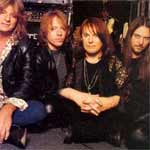 DOKKEN: I couldn’t figure out, you know, was that a compliment? I played at a Bon Jovi concert awhile ago and either Jon or Ritchie said to me, “Pretty scary, huh?” I said, “what?” We were on stage that night, and I thought we were gonna kick some ass. And I walked backstage after we were done and it was like, Bon Jovi fans are all women. I sang “Alone Again,” and I had the mic out -- dead silence. They didn’t know the songs. It was a whole new generation. I was trippin’ on that.
DOKKEN: I couldn’t figure out, you know, was that a compliment? I played at a Bon Jovi concert awhile ago and either Jon or Ritchie said to me, “Pretty scary, huh?” I said, “what?” We were on stage that night, and I thought we were gonna kick some ass. And I walked backstage after we were done and it was like, Bon Jovi fans are all women. I sang “Alone Again,” and I had the mic out -- dead silence. They didn’t know the songs. It was a whole new generation. I was trippin’ on that.
KNAC.COM: What made them more appealing to a younger dynamic? Granted, Poison came along later, it that part of what makes Bon Jovi viable now?
DOKKEN: The one think about Dokken that people don’t seem to realize is that when you talk about hair bands or metal bands in the eighties is that Poison hit the scene in, what, ‘87?
KNAC.COM: Yeah, they came towards the end.
DOKKEN: We came out in 82. By the time Poison, Warrant, Slaughter, White Lion, Skid Row, all made it, Dokken had already sold about four platinum albums. We had done five world tours with about the biggest bands on the planet—AC/DC, Dio, Judas Priest and Aerosmith. We did it all. So there’s all these people sticking Dokken in this genre, and I’m like, excuse me, we had gone and become millionaires with homes by the beach while those guys were just starting out. I remember Jon Bon Jovi coming to our shows to hang out with Dokken so he could get his picture taken. He had just started out. The guys in Poison used to come to the Dokken shows too.
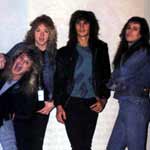 KNAC.COM: Yet you weren’t really a part of that L.A. club scene…
KNAC.COM: Yet you weren’t really a part of that L.A. club scene…
DOKKEN: I went to Germany because it just wasn’t happening here. When I came back from Germany, it was over. Before I left, you had the Knack and Missing Person, and it just wasn’t what I was into. The guys in Devo used to come and watch me, and the reason they told me they were there was because I was the “antithesis” of what they wanted to be. You know, we had long hair. We epitomized what they didn’t want to be. We were playing a place called the Starwood then, and I was thinking that I’d like to go and see them and see what their trip was. Then, I saw their glasses, their keyboards, and I was thinking they were exactly what I didn’t want to be. Maybe twenty years from now Devo will be remembered more than Dokken, who knows?
KNAC.COM: Yeah, but you’re still making music and touring, while…
DOKKEN: It’s been strange. Why do people keep coming to our shows? Why is it the last three or four times we’ve sold out Albuquerque? Why? Is it nostalgia? I don’t know. The weirdest thing about this tour is that, I swear to god, the two new songs that we do live get some of the biggest responses. That’s very strange. I’ve been singing Sunless Days every night because it is very different for Dokken. It’s the hit, which is called Little Girl, is like the Beatles. My thing was, we’ve seen all this Radiohead, System of a Down, Slipknot, you know, so what would the Beatles do? What would they sound like? This is what I think they would do.
| “I’m fucking hard to deal with. I want the music to be over the top. If it’s a hundred percent, I’m going, “what about a hundred and five?” I’m always pushing. It’s just my personality.” - Don
|
|
KNAC.COM: So basically, fans can expect an album that pays special attention to melody? Will the lyrics reflect where you’re at now? Is there ever a worry that the fans will accept it?
DOKKEN: Yeah, I also realized that the underlying thing about success is I can’t fight it any longer. I was part of the corrupt, corporate star machine. There was payola going on big time. You want a song on the radio? Go out to lunch, shove an envelope under the table. It was going on all over the place. It was all about money, money, money, money. A big label can say, take this band—total crap—and put all kinds of money behind it. It’s a sheppard’s mentality, and you can get those sheep follow. You can take a Slipknot and say this is the greatest thing ever and you can make it happen if you’ve got the resources. Or you’ve got the hardcore way, grassroots where you play the bars, play the clubs, play the theatres. Basically do it the way Metallica did it. They couldn’t get on TV, they couldn’t get on the radio. They couldn’t even get in a magazine. How did they do it? The songs were just too strong, too powerful to ignore. I tried to do that with Dokken -- the old fashioned way in '82, '83 and we couldn’t get arrested.
KNAC.COM: How much of that time when you were just starting out was given up to you worrying about exposure, individual finances -- the business aspects of the music industry?
DOKKEN: None.
KNAC.COM: You didn’t? Was that to your detriment?
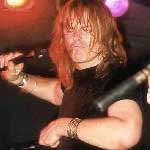 DOKKEN: Yeah, totally. Luckily we had a manager like the most famous manager in the world, Q-Prime. The same management that had Def Leppard, and Metallica later, and they knew how the game was played. I didn’t know. I’d be like, how can we get to Milwaukee, and it’s sold out and then go to Chicago and ten people show up. The answer would be, “we couldn’t get you on the radio there.” Why? Either they couldn’t be bought or somebody’s got a hard on for somebody. Somebody they didn’t like at the record company, so they’re gonna snub you. Politics. It was like being in Washington. The music business was really scary. It was who knew who. You’d better be nice to this person, you’d better be nice to that person because they could ruin your career. Why? Because he’s the program director at the largest station in the state and if he didn’t like you, you’re fucked. I’m like, the guy’s an asshole. He’s a total asshole. We walk in, and he’s being a jerk to us and we’ve got to be nice to him. Sometimes we weren’t, and you’d see it in the market. You’d need to be a politician. There were certain people, and I won’t say, but they were very good politicians. They’re bigger than ever now because they knew how to play the game. They’re movie stars. They knew how to play the game… and I didn’t.
DOKKEN: Yeah, totally. Luckily we had a manager like the most famous manager in the world, Q-Prime. The same management that had Def Leppard, and Metallica later, and they knew how the game was played. I didn’t know. I’d be like, how can we get to Milwaukee, and it’s sold out and then go to Chicago and ten people show up. The answer would be, “we couldn’t get you on the radio there.” Why? Either they couldn’t be bought or somebody’s got a hard on for somebody. Somebody they didn’t like at the record company, so they’re gonna snub you. Politics. It was like being in Washington. The music business was really scary. It was who knew who. You’d better be nice to this person, you’d better be nice to that person because they could ruin your career. Why? Because he’s the program director at the largest station in the state and if he didn’t like you, you’re fucked. I’m like, the guy’s an asshole. He’s a total asshole. We walk in, and he’s being a jerk to us and we’ve got to be nice to him. Sometimes we weren’t, and you’d see it in the market. You’d need to be a politician. There were certain people, and I won’t say, but they were very good politicians. They’re bigger than ever now because they knew how to play the game. They’re movie stars. They knew how to play the game… and I didn’t.

|




